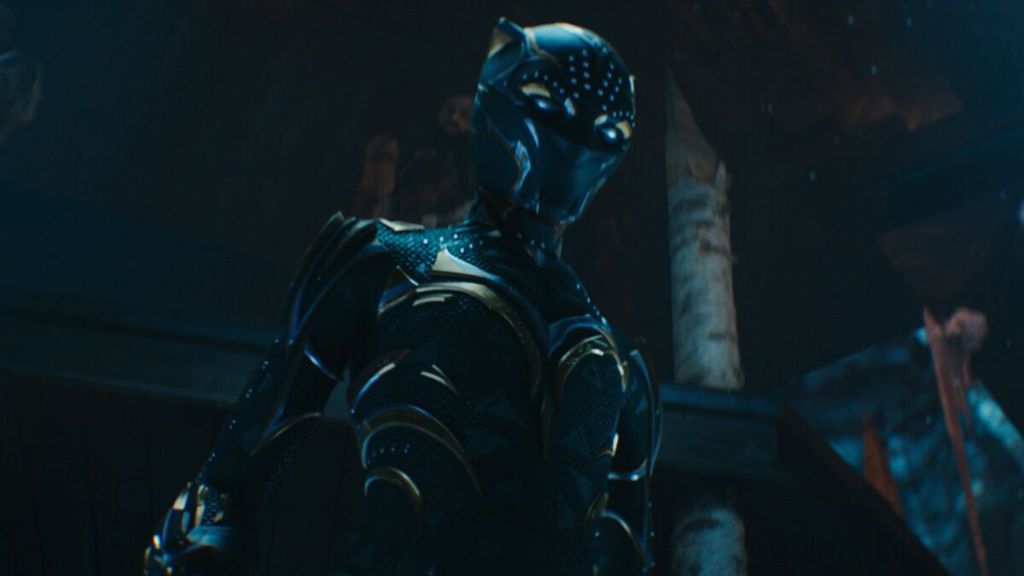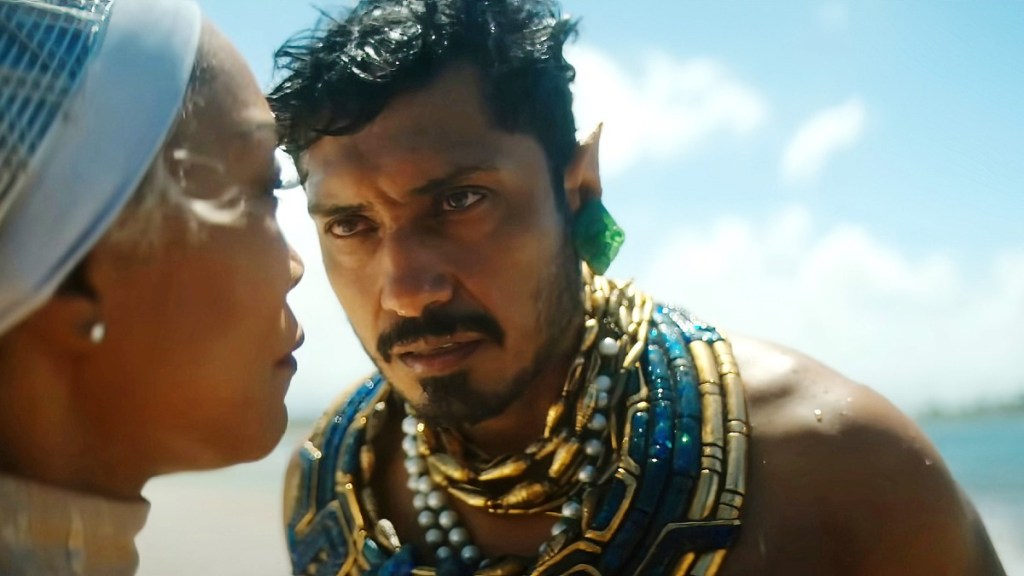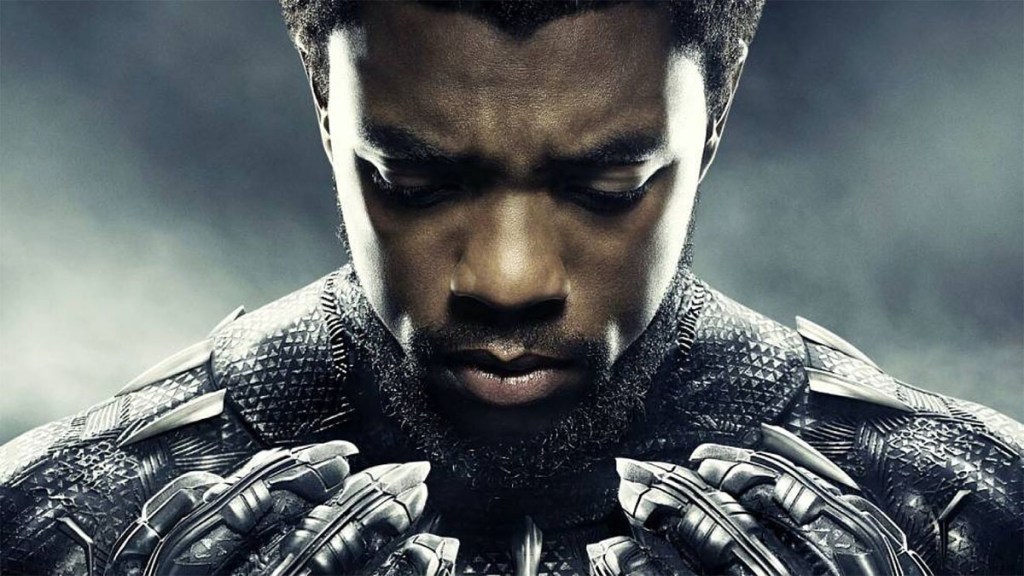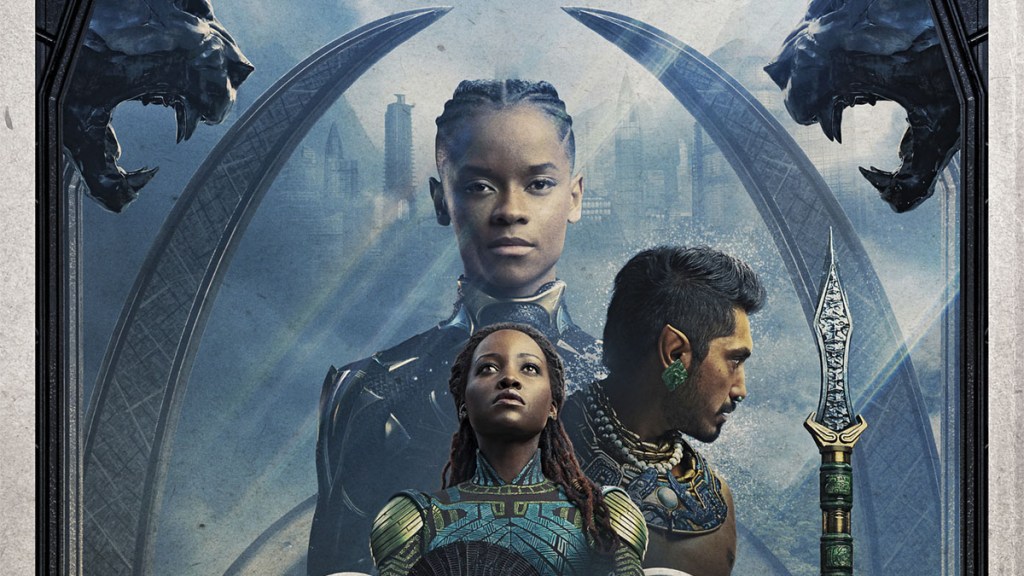If you only buy one movie this year that involves blue-skinned, indigenous water people riding whales into battle against giant ships – and where the blue people are the bad guys – make it Black Panther: Wakanda Forever. It requires more than one viewing to really take in anyway. Whether from the shock of Chadwick Boseman’s death and its impact, or the various troubled aspects of the shoot that may or may not be true, it’s a movie that needs an initial viewing just to be sure of what it’s not, so that you can take a closer look at what it actually is.

And fundamentally, it’s a tale about the damage that can be done when powerful people can’t move on from trauma, with a side dish of the way dominant power structures persuade underdogs to fight amongst themselves. There’s a desire to control the narrative, ensuring no more unexpected surprises cause any more pain. But like a person dealing with grief in a healthy way, the sequel rolls with the changes to become something altogether new.
RELATED: Angela Bassett Filmed Deleted Scene With [Spoiler] in Wakanda Forever
Visually, the 4K and Blu-ray offer almost different experiences. The 4K cranks up the contrast, and veers from eye-straining darkness to harsh white sunlight, with a fondness for tear-inducing lens flares to rival J.J. Abrams. (If the movie makes you cry, it’s not just because it’s sad.) Smaller details stand out in the night and underwater depths, while the lights that try to pierce it can hurt.
There are surely metaphors in there somewhere above our pay grade. The Blu-ray merely lightens the entire image up and saturates the colors more, which lets you see more but in less sharp focus. And while so many scenes in the theater and on the Blu-ray look like obvious rear-screen projection, the 4K composites them better, making them seem more like backgrounds just out of focus.
There is a commentary track, on the Blu-ray disc only, featuring writer-director Ryan Coogler, writer Joe Robert Cole, and cinematographer Autumn Durald Arkapaw. Somebody has clearly informed Coogler that on the first film’s commentary, he used the phrase “Ya know what I’m sayin’” approximately once every two minutes. Coogler mostly refrains this time, although he falls back into using it towards the end. With Arkapaw there, they talk about where and how they shot most of the scenes, and which of Cole’s lines got cut. The track was recorded after the film’s release, so they also refer frequently to crowd response to various moments.
RELATED: Black Panther: Wakanda Forever Promo Reveals Origin of Namor’s Armor
Nobody should be surprised that the commentary doesn’t reveal any gossip – about Letitia Wright, for example – but it’s a bummer that they never discuss how plans evolved and changed after Boseman’s death, or what alternatives they may have considered for T’Challa’s fate. They do hint at what exactly is going on with the mantle of Black Panther at the end of the movie, though. Did Shuri abdicate, and let M’Baku win the challenge? Not so fast. Coogler points out that in Wakanda, nobody but the Black Panther wears black casual clothes…and Shuri’s still wearing them in the final Haiti scenes. Wright’s all over the extras, suggesting that whatever happened on set, the studio has confidence in her now.

A pair of too-short featurettes offer some glimpses of how the underwater scenes were done, with a lot of practical sets actually submerged in tanks, along with occasional dry-for-wet scenes when characters had to move super-heroically underwater. Wakanda Forever didn’t boast about its actors free-diving as much as Avatar did, but they seem to have done just as well. The gag reel shows it wasn’t all tears on the set – with Martin Freeman and Julia-Louis-Dreyfus the unsurprising smartass ad-libbers. Deleted scenes reveal more of Okoye’s subplot, which gives more resonance to her dismissal from the Dora Milaje, and a bit of toilet-related espionage with Agent Ross that’s just as well removed.
RELATED: Wakanda Forever Co-Writer Explains the Introduction of [SPOILER]
Talokan’s design turns out to be more significant than it may have looked initially, too. Namor is long-lived, but not that long-lived, so much of the cultural art there is recreated by him from his memories, and not necessarily reliable. It’s a great character note that reveals a lot about him.

A Rihanna music video would have been nice – “Lift Me Up” will likely lose the Oscar to RRR‘s “Naatu Naatu,” but it’s one hell of a song, and fits perfectly – viewing it at will with imagery other than the end credits might be nice.
RELATED: Listen To Rihanna’s “Lift Me Up” From Black Panther: Wakanda Forever
Although it’s due to tragic external circumstances, Wakanda Forever is forced to dig deep and handle real-world issues in a ways not many Marvel Studios movies have. When they have before, like Eternals, they weren’t always well-received. That’s what makes this so unusual on the surface, even as it plumbs literal and metaphorical depths. Like grief itself, it shouldn’t be dismissed out of hand, but allowed to linger. Indeed, the movie and the sadness maybe bear a bit more analyzing, which is why there should have been many more extras.
Black Panther: Wakanda Forever comes out on Blu-ray on Tuesday, February 7.
Movie: 4/5
Extras: 2.5/5
Recommended Reading: Black Panther: A Nation Under Our Feet Book 1
We are also a participant in the Amazon Services LLC Associates Program. This affiliate advertising program also provides a means to earn fees by linking to Amazon.com and affiliated sites.
wakanda forever 4k review. Also wakanda forever 4k review. However, wakanda forever 4k review. Also. However. Regardless. Additionally. Also. However. Regardless. Additionally. Also. However. Regardless. Additionally. Also. However. Regardless. Additionally.




